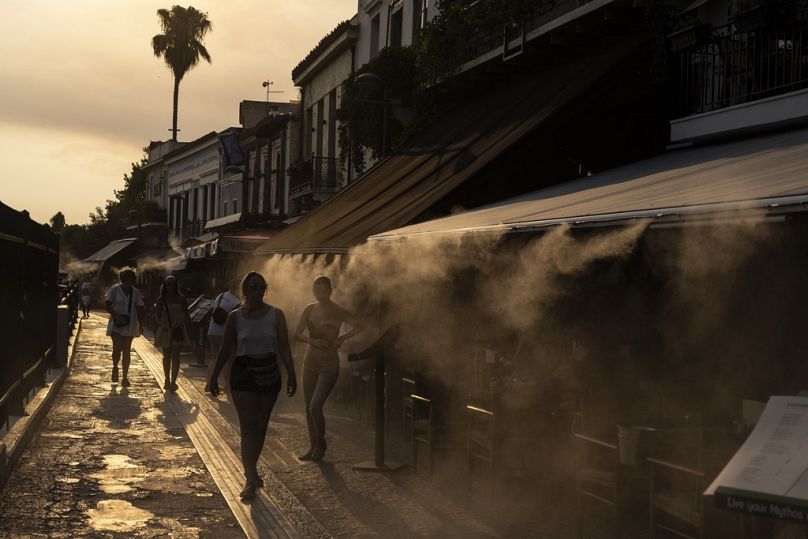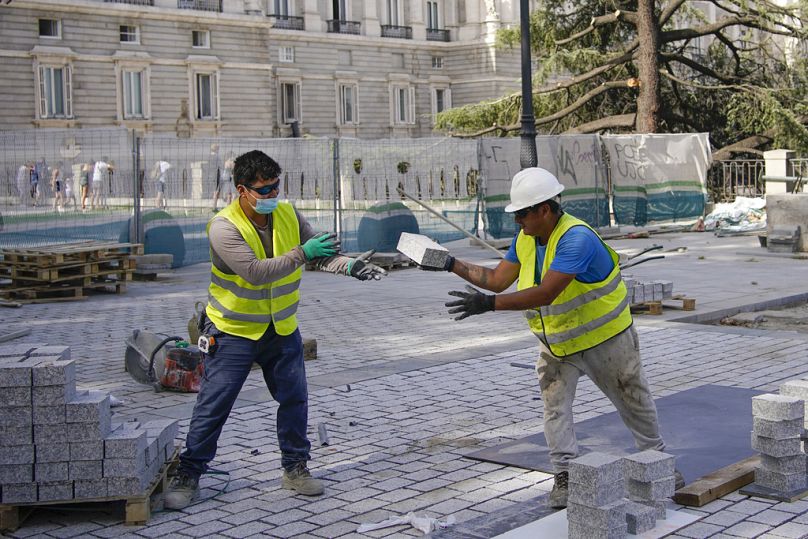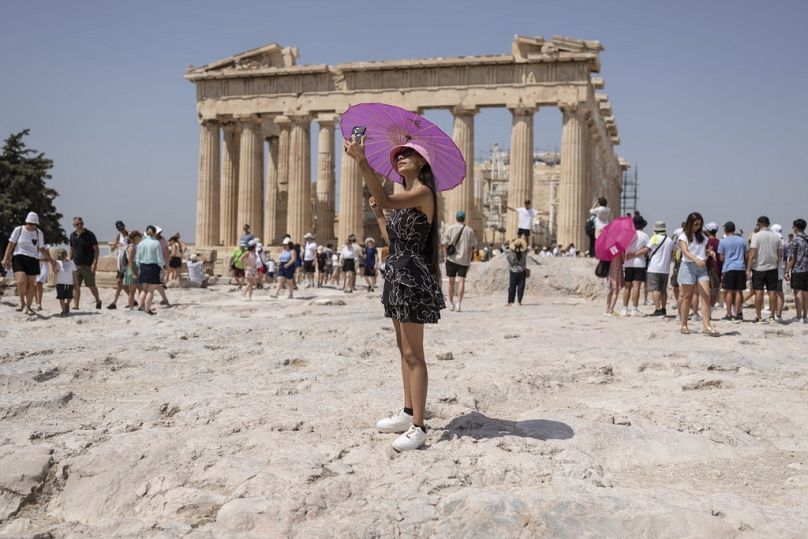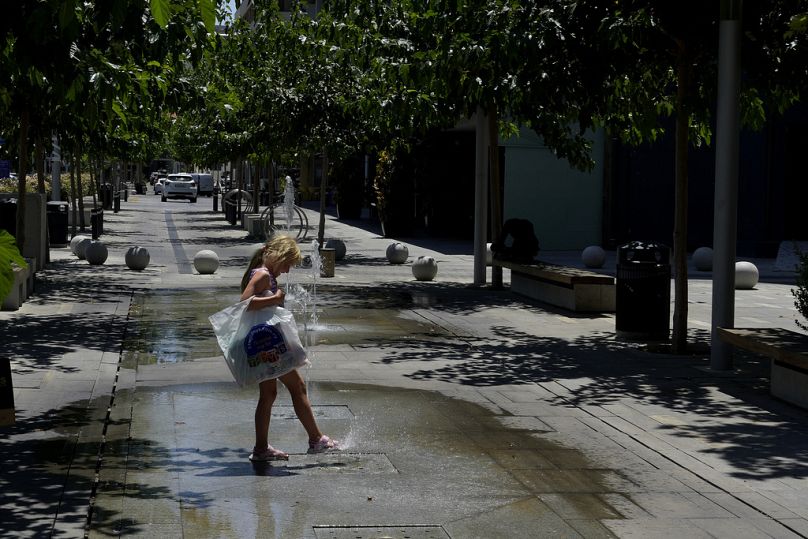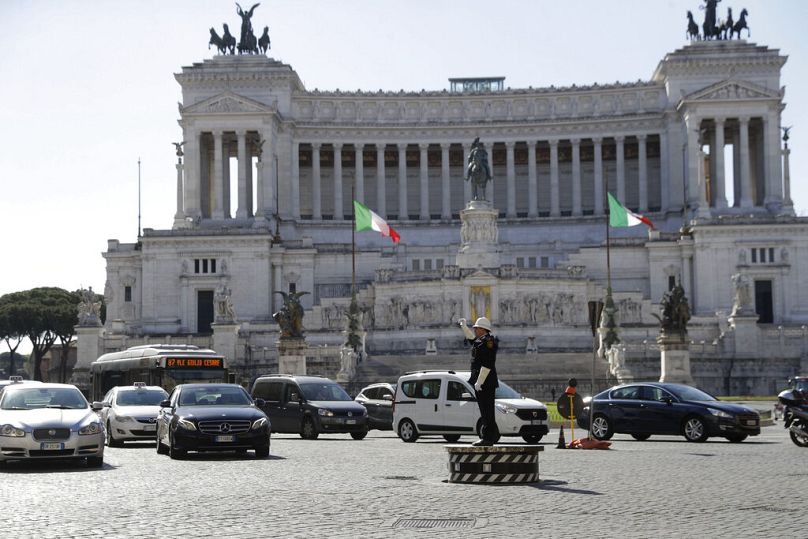As Europe swelters in record temperatures this summer, Euronews View spoke to Global Chief Heat Officer at UN-Habitat Eleni Myrivili about the impact of the extreme heat and what can be done to save lives and make our cities more liveable.
Large parts of southern and eastern Europe have been sweltering in soaring temperatures once more due to the latest string of heatwaves caused by a massive anticyclone aptly named Charon.
The record-breaking temperatures reached the mid to high 40s in Italy and Greece and even approached the 50s in parts of Spain, causing a spike in heat-related deaths as authorities scrambled for measures that would ease their impact.
Wildfires, another consequence of extreme heat, have been raging in several European countries, including Greece and Italy, disrupting travel, endangering towns and cities in their path and forcing evacuations of tens of thousands of people.
The continent has experienced a similar pattern over the previous summers, yet scientists are now warning that the window to turn things around and revert the climate emergency is becoming exceptionally slim.
Euronews View spoke with Global Chief Heat Officer at UN-Habitat and Board Member at the EU Mission for Adaptation of the European Commission, Eleni Myrivili, about the consequences of extreme weather events have on the continent's citizens and the immediate and long-term measures governments can implement to save lives and make our cities more liveable.
Euronews View: You have done an immense amount of work on extreme heat both locally in the city of Athens and on a much larger scale. What can you tell us about where we are now in 2023 in terms of the heatwaves we are experiencing?
Eleni Myrivili: I've been working since 2021 in Athens as a chief heat officer, but I had started working on heat resilience before that in Athens, so I created the strategy and started doing different kinds of measures and policies in relation to heat resilience since 2017, and I didn't really expect things to accelerate so fast.
I mean, it's not really a surprise, but this year, with the heat domes sitting over the US, the Mediterranean, the Middle East and China, it kind of got really scary. It's been weeks and weeks of heatwaves and then a couple of days of respite, and then again and again.
It feels like we might have started spinning out of control, which is something that the scientists have been talking about and which is what we've been trying to prevent by sticking with the 1.5C above pre-industrial levels, with the Paris Agreement.
But it seems like things have started maybe already to get a little bit out of control because it's happening fast, right?
In Europe, we seem to be heating up twice as fast as the global average. The global average today is 1.1C, 1.2C, and in Europe, we've already reached an average of 2.2C from the pre-industrial era.
And that's because the Arctic is heating up very fast and because of the Mediterranean. So the south and the north are bringing up the average.
But hopefully, this will become a wake-up call because it's in the Northern Hemisphere, so the big polluters are the ones now dealing with these extreme heat events, and I'm still hoping this will move the mitigation aspect much much faster.
Euronews View: The extreme temperatures felt in the south of the continent have still not reached Europe's generally colder parts. Could you explain what kind of difficulties people experience in their daily lives in a city like Athens, where they have to deal with rolling heatwaves like we've seen this summer?
Eleni Myrivili: First of all, it's the fact that we have a very high death threat. We don't really know yet, but we're very worried about what the impact of these rolling heatwaves will be on the mortality of the people that are most vulnerable in Athens.
We have a city that has a lot of people that are above 60 years old — in Europe, we do have a lot of people that are older in relation to other continents. We have a high average age, and this is a problem because people over 60 are particularly vulnerable to extreme heat.
But it's not just them. It's also women that are pregnant, babies, young children, and people with pre-existing conditions — any kind of pre-existing conditions, any kind of problems that the body might have from physical to mental illness, really deteriorates fast with heat.
And then we also have people that work that are also very vulnerable, and we're really worried for their health.
So last year, in 2022, we thought we had lost about 15,000 to 20,000 people in all of Europe linked to extreme heat. Two weeks ago, we had a report that actually raised the number to over 60,000 people.
When we lose 60,000 people in one summer because of one extreme phenomenon, we have to make sure people realise how bad this is. So one aspect has to do with death morbidity and mortality, and we will find out months later what the exact numbers were.
The other very big issue is work productivity. So we have a city that starts kind of not really functioning because everything slows down, and all the kind of ways that people interact and all the ways that people work slow down.
So that's why we have the people that are working in manual jobs because of fatigue because they don't sleep. Due to this long period of heat, what starts happening is that we have higher levels of work-related injuries.
**Euronews View: What about lifestyle and basic services?
**
Eleni Myrivili: Another issue that happens in Athens is that the city slowly empties out, the people withdraw inside or into airconditioned areas, or they come out only at night or after sunset.
This is a real pity because our cities in the Mediterranean are lively and beautiful, and vibrant in the summer. People in them love to meet and hang out and eat and talk, and I'm hoping we're not going to see our cities become more and more cities that are just outside-inside, where this continuum kind of stops.
And finally, tourism is also an issue. We have to realise that we have to protect the tourists who might not be so accustomed to these crazy temperatures.
So in Athens, together with the Red Cross, we had ambulances outside of the Acropolis giving out water and information, we closed the Acropolis and other archaeological spaces, but it's a weird kind of shutting down of vital parts of the city.
And also, there's the fear of energy blackouts. We have had a few blackouts in some of the suburbs, but I believe they were more linked to the fires that were closer to Athens about two weeks ago.
But there is this lingering stress about our infrastructure, especially our basic resources: water, energy, and food that we will make sure we have enough — and thankfully, we didn't have any serious problems yet as far as I can tell.
Euronews View: All of this points to a bigger trend where the quality of life suffers, which seems very juxtaposed to the general outside view of "Well, doesn't that just mean that you have nicer weather for longer," or "The tourists are going to love it, and more tourists are going to come because it's sunnier and hotter and they're going to enjoy the seaside even more."
**Meanwhile, what kind of remedies are there that you can maybe envision or propose that can be done immediately? **
Eleni Myrivili: One thing that has made me happy is that since last year, the Greek Ministry of Labour and the city of Athens have created a decree that has put into effect a really detailed set of guidelines for workers and employers that they have to follow in order to protect the workers from heatwaves.
And also, just last week, because we had the real peak of the third heatwave, there was a special addition to the decree that between 11 am and 5 pm, they prohibited all deliveries, including closing down all the platforms for deliveries. This is really at the forefront of all the different measures that we can take.
Then there is a whole series of different measures that we can take to protect the most vulnerable.
A lot of cities have done a lot of different things, but there are more short-term measures like making sure that during heatwaves, people have access to information, spaces that can protect them, and water and cooling mechanisms so that they can protect themselves.
Then the other big category is creating cities that are cooler, which involves how we deal with the public space, how we design the public space and what we do with the public space and how we deal with our construction sector and how we retrofit kind of our construction sector so that we can make a difference.
Euronews View: Thinking ahead, what would be the actual cure for this? What would be the solution?
Eleni Myrivili: So the main thing, just the most basic thing that gives comfort to people, is shade.
If we manage to give them shade from trees and water elements, this is the best possible option because trees don't just create shade — they do this thing called vapour transpiration, which lowers the temperature, so actually, they are amazing for people, and they're life-saving for cities.
We have to slowly make our public spaces, which are made out of cement and concrete, into more water-permeable, green-and-blue kind of infrastructure.
And we also have to slowly take cars away from the city centres, which often is not very popular but will become more and more a matter of survival for our cities.
Cars heat up the atmosphere and the air of the cities even more, like air conditioning, and also they take up a lot of our public space.
In many of our cities, the majority of our public spaces are dedicated to cars, which is ridiculous, so this has to stop.
And also, we have to stop making any kind of public places, such as big squares and big monumental interventions, that don't take into account the idea of the idea of lowering temperatures by creating wind movement or shading into the design really seriously.
These are the basic principles that we have to start using for our public spaces and one of the most important things we can do for our cities.
I call this third pillar redesign — a whole series of things we have to do to redesign our cities, and the second pillar is something I call preparedness — which are all these short-term measures we can take to protect the most vulnerable.
The first pillar is what I call awareness raising, which is ensuring that we make it clear that this is a very, very dangerous factor for our health.
There's no other disaster out of all kinds of disasters linked to extreme weather events, or linked to other things like earthquakes, that has the amount of mortality linked to it as the heat has.
In Europe, we're talking about hundreds of thousands or 100,000 in a decade, while all the other things amount to 1,000, 3,000. The numbers tend to be really, really small in relation to the people we lose to the heat.
And this is still something that people have to realise — and realise the seriousness of it.












